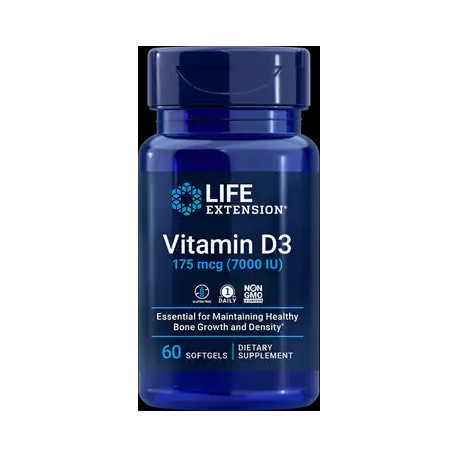




Security policy

Delivery policy

Return policy
60 soft gels, 7000 IU
A review article in the July 19, 2007 edition of the New England Journal of Medicine makes a compelling argument for Americans to supplement with more vitamin D.
The authors point out that between 40% and 100% of elderly people in the United States and Europe have insufficient or deficient levels of vitamin D. They also highlight disturbing findings that even children and young adults who supplement with 400 IU/day of vitamin D and consume vitamin D-containing foods often suffer from a vitamin D insufficiency.
When addressing critics who argue that studies using 400 IU of vitamin D do not show much benefit, the authors provide meticulous data showing that far higher doses of vitamin D are needed and that it is the amount of vitamin D in one’s blood that determines disease risk reduction rather than how much is actually swallowed.
The authors have calculated the rates of various diseases affected by vitamin D status and have come up with the following startling numbers:
* 78% reduction in Type 1 diabetes in children taking 2,000 IU/day of vitamin D in the first year of life
* 200% increase in Type I diabetes in vitamin D-deficient children
* 33% reduction in Type II diabetes in those taking 800 IU/day of vitamin D plus calcium
* 72% reduction in number of falls in elderly people taking higher-dose vitamin D
* 30-50% more cancers in vitamin D-deficient people
* 42% reduction in multiple sclerosis in women taking more than 400 IU/day of vitamin D.
The New England Journal of Medicine authors then document increased incidences of autoimmune diseases, osteoarthritis, depression, hypertension, pulmonary disorders, schizophrenia, and cardiovascular diseases in those with less than optimal vitamin D status.
Furthermore, the authors of an editorial published in the American Journal of Clinical Nutrition have been sharply critical of the media and the government for failing to urge Americans to consume more vitamin D. This editorial, titled “The urgent need to recommend an intake of vitamin D that is effective,” goes on to state:
1. Human diets do not provide sufficient vitamin D.
2. Minimum vitamin D blood levels needed to reduce disease risk are 30 ng/mL.
The writers pose the question: “If a concentration of 75 nmol/L [30 ng/mL] is the goal to be achieved by consumption of vitamin D, then why is it so rare for members of the population to accomplish this?”
The American Journal of Clinical Nutrition editorial lashes out at the media for misleading the public about the amount of vitamin D they need to supplement with. As the authors point out, government-based recommendations of 200 IU/day for children, 400 IU/day for those aged 51-70 years, and 600 IU/day for those over 70 are horribly outdated. Yet fears of liability cause the media to continue regurgitating antiquated government vitamin D potencies that were long ago shown to be inadequate.
Europeans Are Even Worse Off
If you think Americans have a problem, just imagine if the government forbade dietary supplements to contain in excess of 400 IU of vitamin D. In Europe, the upper limit potency is only 400 IU of vitamin D, making it difficult for people there to obtain adequate levels.
A German doctor authored a meticulous review showing significant reductions in cardiovascular disease and diabetes (in children and adults) in response to higher vitamin D status. As cardiovascular disease and diabetes account for up to 50% of all deaths in western countries, this doctor warned of significant health consequences if the pandemic of vitamin D deficiency was not corrected. The German doctor concluded his paper by stating:
“Given the high prevalence of insufficient and deficient vitamin D blood concentrations in the general population, an improvement in the population’s vitamin D status must be a major effort for public health service in the future. For that reason, in many countries, legislation has to be changed in order to allow a vitamin D amount in over-the-counter supplements and vitamin D fortified food, which is sufficient to increase serum measurements of vitamin D into the adequate range.
Take 1 capsule per day.
1 capsule contains:
Vitamin D (as cholecalciferol) 5000 IU
Natural Iodine 1,000 mcg from
Sea-Iodine™ Complex Blend
Other ingredients: rice flour, vegetable cellulose (capsule), vegetable stearate, silica, maltodextrin.
Individuals consuming more than 2,000 IU/day of vitamin D (from diet and supplements) should periodically obtain a serum 25-hydroxy vitamin D measurement. Do not exceed 10,000 IU per day unless recommended by your doctor. Vitamin D supplementation is not recommended for individuals with hypercalcemia (high blood calcium levels). People with kidney disease, certain medical conditions (such as hyperparathyroidism or sarcoidosis), and those who use cardiac glycosides (digoxin) or thiazide diuretics should consult a physician before using supplemental vitamin D. If you have a thyroid condition or are taking anti-thyroid medications, do not use without consulting your healthcare practitioner.